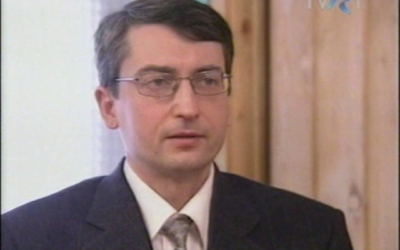Author: Calistrat M. Atudorei – 02/08/2019
The following article constitutes the Introduction of the coming English version of Calistrat M. Atudorei’s book: Planurile Americii Pentru Hegemonia Mondiala (America’s Plans for World Hegemony)
After the official dissolution of the Soviet Union in December 1991, the United States remained the world’s single superpower. Prior to that event, there had been two big blocs of power—the capitalist and the communist one. From that moment on, the global structure became unipolar, dominated ever more by America. Representatives of the Washington administrations declared that assuming the global leadership role requires the United States to be the guarantor of stability and peace at global level. Yet, by virtue of this self-assumed status, America arrogated a series of privileges and initiatives which, unfortunately, reveal intentions other than altruism, gracefully presented by diplomats and widely spread by the media.
From the beginning, an explanation is called for. When we relate to “America”–or more precisely to the United States of America— one cannot speak of a single entity that represent a unitary orientation, let alone a very coherent one. This is due the fact that in the United States there is a considerable gap between the financial-political class and the population, or even between the group that supports the current president, Donald Trump, and the old political-administrative establishment. Most noteworthy is a very rigorous study by Princeton University, which states that the US is no longer a truly democratic state, but one led by an oligarchy, an “Elite” that does not really represent the will of the people. In fact, many personalities from the United States, including presidents Kennedy, Eisenhower or Donald Trump spoke of this “Elite”. The term refers to a structure also called the “military-industrial complex,” the “financial cartel,” the “Deep State”, the “Parallel State” or various other names. So, when I refer to “America’s Plans” it does not mean at all that these plans would represent the predominant views or will of the American people.
Let us review some of the actions of the American administrations in recent years. The so-called “humanitarian interventions” in countries such as Iraq, Libya or Syria left behind a real genocide (millions of dead), huge material disaster, social chaos, and a great deal of suffering, which are by no means the very promised “democracy” and peace. The withdrawal of America from various major international agreements previously ratified—such as the Anti-Ballistic Missile treaty (ABM), the Intermediate-Range Nuclear Forces Treaty (INF), the United Nations Human Rights Council, or JPCOA, the treaty with Iran— indicates an increasingly pronounced position of the White House leaders above international norms of partnership and cooperation, and reflects almost straight defiance of most other states.
Retreat from ABM treaty was motivated in 2001 by President George Bush on the ground that the treaty’s provisions “limit the ability of the United States to develop defensive weapons,” that is, nuclear missiles that were not allowed by international standards. Standards that America systematically boycotted through a high number of vetoes in the international Councils for disarmament…
United States representatives at the United Nations labeled the Human Rights Council—centered on positions expressed by experts in 47 states—as “hypocritical” because of the criticism of US and Israeli foreign policy. Washington, however, finds it perfectly justified to have ordered the invasion of Iraq in 2003 under a pretext that proved to be false, but which led to the death of hundreds of thousands of people. With regard to the treaty with Iran, the US claims to hold information that Iran develops nuclear weapons, but it failed to bring any concrete evidence in this respect. All this occurred while the International Atomic Energy Agency (IAEA) published over the past years ten reports that certified that Iran complied with its commitments and was not developing nuclear weapons.
We may ascertain that it became a habit for the United States to launch attacks on other countries ignoring the opposition of the UN Security Council or without presenting any evidence of allegations related to those states. Another already very transparent habit is—as the pages of this paper will reveal—the more or less secret funding of “rebel” groups. Subsequently, they embody the pretext of overthrowing undesirable governments for the US (governments that apparently persecute the “rebel-protesters”), or the pretext for the “war on terror.” To be honest, the “war on terror” also brings numerous arguments for arming, reasons for invading other states, justifications for population surveillance, and opportunities for arms sales. In September 2018, when charged with war crimes by the International Criminal Tribunal, the US administration launched outright threats that it would punish Court officials if they would follow US through any investigations; the threat also referred to all states supporting the potential investigation.
It is worth to emphasize some significant cases of double-standard behaviors on the international scene: the United States and NATO have devastated over the last 20 years a whole host of states, ruined them socially and economically, killed millions of people, but in the rhetoric of the Northern-Atlantic alliance leaders there is no assumption of any mistake, even more, everything is covered under the positive terms of altruism. Instead, the Russian Federation has been loudly accused by the West, and consistently pointed at as a great danger to the international community. The main reason—for which it is subject to economic sanctions—is that in 2014, being increasingly surrounded by NATO bases and American ballistic missiles, it annexed an old territory of its own, Crimea. Without violence, with the consent of the population, who participated in a referendum. At the same time, Israel forcefully annexed the Golan Heights and is systematically killing the Palestinian civilian population, to the United Nations’ general dissatisfaction. But in this case no sanctions are imposed, and the United States are positioned as the guarantor and protector of Israel. We can see the same double standard in the position of the United States towards Venezuela and Yemen, respectively. The UN has announced for four years that the worst humanitarian crisis in the world is taking place in Yemen, with 80% of the population threatened with death by famine or war. The American Administration’s reaction? The US does not trigger any of its frequent humanitarian interventions to forcefully restore peace and democracy. Moreover, it supports the aggressive regime itself, Saudi Arabia. In contrast to Venezuela, the richest country in oil, the US applies tough sanctions, which UN rapporteurs consider “crimes against humanity.” Representatives of the White House also state that a regime change must be operated in Venezuela because the suffering of the people comes from the dictator who does not accept the solution to let America intervene in Venezuela to defend the democracy.
Even in its official documents, including the National Strategy 2018, (which represents the orientation of America until 2022), the White House admits that its first objective is to advance an international order leading to the supremacy of the United States. Although US diplomats assured us that this is for the global good, their view on how they want to set a world peace climate is still worrying. As I will show in detail, the vision of US strategists is to “achieve peace through strength,” which paradoxically implies “preparedness for war”! And indeed, the US arming increases from year to year. America now has over 800 military bases outside the country, it considerably progressed in the militarization of outer space and is constantly seeking to expand its stock of lethal, extremely powerful weapons of all kinds. What kind of war is America preparing for since it is already the greatest power in the world? But challenging the US supremacy is a very sensitive issue, especially in the totally dominated countries (or, perhaps, better said “colonized”) by the United States. The topic of the “American dream” deficiencies is a kind of taboo and the alternative is immediately evinced: would it be better to be led by Russia or China? Or should we be dominated by Islam? Or to get international terrorism out of control? Politicians, commentators and analysts in “Americanized” countries unanimously appreciate in the media that someone has to lead and then America is the best!
It would, of course, be absurd to look at things in black and white. There are wonderful things in the United States, as there are serious issues in other parts of the world. Certainly, the American people, like any other one, is well-intentioned. Unfortunately, it’s not the people who decide the US foreign policy. On the other hand—and I want to emphasize this—millions of people around the world condemn, for example, the atrocious campaign of the Chinese government for almost 20 years against the Falun Gong spiritual movement. At the same time, Europe is becoming more and more revolted at the violence that Islamic immigrants manifest in the countries where they were welcomed. There are serious deviations from the values of civilization and international law in many parts of the world. Surely, the best way to solve tensions is through peaceful co-operation, based on the observance of commonly agreed rules.
The purpose of this research is to provide a picture of international power relations, which have been dominated by United States since the end of the Cold War. The paper has been grounded on highly credible sources: official or recently declassified documents, statements made by important personalities, events recorded by historians or the media, interpretations of experts from different fields. As the Western community appreciates Russia’s opinions and declarations (considered as the greatest threat to world peace and stability) as subjective, I preponderantly provided views from authoritative Western sources. Even so, analyses conducted by high-profile experts point to a clear and determined global agenda of the United States foreign policy in the sense of a carefully structured and partly already implemented plan that seeks to achieve and maintain the global hegemony.


Calistrat M. Atudorei, romanian political scientist. His last work is: Planurile Americii Pentru Hegemonia Mondiala: Studiu, 2018
Calistrat Atudorei was born in Bacău, Romania, on March 4, 1968. He studied technical disciplines at “Gheorghe Asachi” University in Iași and worked for a period as engineer. For about ten years he collaborated with several human rights organizations and turned his interest to social sciences. Currently he is a PhD student at the Faculty of Philosophy at the University of Bucharest, where he focus on the field of International Relations.
He published articles related to social sciences in magazines and specialized sites in Romania, such as Lumea, the website of the Union of Professional Journalists or ActiveNews.
